Popout
Our best wishes to our family and all our friends for a Happy New Year!
Saturday, December 30, 2006
Wednesday, December 20, 2006
Women and the Two Body Conundrum
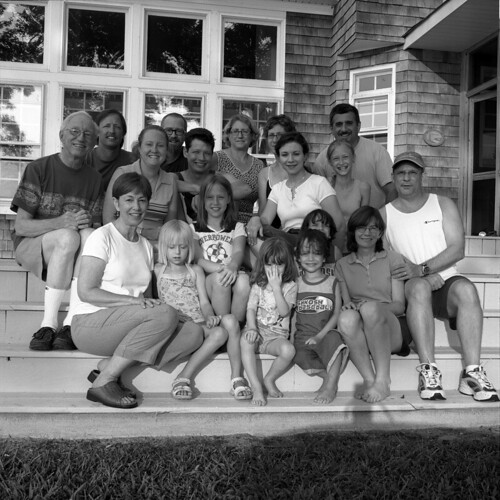
Women in Science: The Battle Moves to the Trenches (NYTimes, 12/19/06)
The New York Times has an interesting article about the "two body" conundrum facing women working in the sciences - a conflict I would argue is present for women in nearly every professional career. There are other aspects of this article surveying the inequities in the sciences that result in more women entering and then leaving the field compared to those numbers among men. However, the two body conundrum is one that is a frequent topic of conversation between my wife, a corporate lawyer, and me, a poet and photographer. Briefly, the two body conundrum is the unresolved conflict between having a career and having a family. In order for women to resolve this conflict successfully, they either have to be gifted individuals with exceptional skills that cannot be readily acquired by others or have two bodies, the punch-line being that no one can be two people. Thus the conundrum.
I think, however, it is also the answer. The focus of the article is upon emancipating women and equalizing the playing field, but it doesn't really address the underlying problem of WORK in the current era, though the article hints at the issue when it questions (through a quote from Evelyn Hammonds, professor at Harvard) whether a 70 hour work week is truly required for anyone to succeed in science. I feel the underlying problem is that contemporary models for employment & career building do not create space for the building of families or even the maintenance of a well individual. The article presents accurately that one of the most tenacious inequities women face emanates from the perception of their relationship to child-rearing as being disruptive to the dedication required for women to be serious scientists. What the article does not discuss is that this perception is based on an equivalent & opposite assumption that child-rearing will not be disruptive to a man's career, because it is institutionally assumed that men will disappear from the family during the period of time required for them to establish themselves in their field.
My father is a scientist and was an academic for 40 years. Until I was ten years old, he was barely home during the week. He left for work at 7 in the morning, returned at 6 in the evening for dinner, and then returned to the lab at 7:30 until after I was asleep. When my mother died, much of the friction in our family was the result of his realization that his absence made my mother the sole historian of those years, followed by his struggle to accept that he could not repair that absence, no matter how well intentioned his efforts might be. My father, if offered the opportunity in retrospect to be two bodies and build his career and his family simultaneously, would have signed whatever Faustian contract was required in order to do so.
The reason that the two body conundrum is difficult for women to overcome is that it is an untenable proposition for anyone - man, woman, mother, father, or parents of any configuration - commited to creating a healthy family. Individuals cannot solve the two body conundrum, because individuals by definition cannot be two bodies. In a family, the second body is the second parent, and current models of employment and career building demand that one parent MUST be absent in order for the family to generate the resources required to raise a family successfully. The current model is not healthy. People should not be doing it. Employers - universities, corporations, factories - are getting away with an unjust stipulation when they force either parent to acquiesce to those terms in order to build a career. And governments are subverting their responsibility to families in situations where a single parent is forced to manage a family without access to the resources having two bodies would otherwise present - child care, health care, and time off from work.
Thurgood Marshall was asked at the end of his career as Supreme Court justice, whether black people were better off now than they were when he first started practicing law. His answer was that the question itself was moot. People are better off now. No one is served by inequity. Humanity is lowered by what costs prejudice exacts upon the spirit of the community. So too I think in terms of women's access to an equitable workplace. I think the goal is not merely make the workplace more equitable to women. The goal is to make the work place more equitable and thus, more humane. We will all benefit from that increase - as individuals, as men, as women, and as parents.
Monday, December 11, 2006
Barack Obama so mr
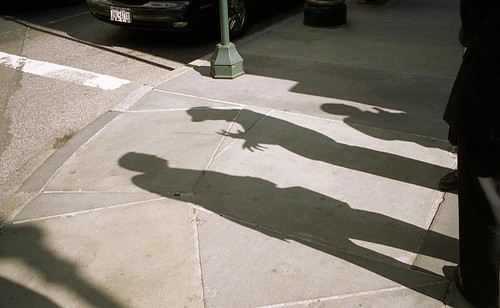
Barack Obama
So Mr. Obama goes to New Hampshire. I would just like to say that I am worried about an Obama candidacy. A number of people have told me he is a tremendous orator, and that he leaves his audiences with a sense of optimism that the most difficult problems of the country are indeed difficult, but they are not impossible. I have read his speeches in written form and even without the accompanying timbre of his voice, I find them to be charismatic in the way friends have described. I wonder how conservatives hear his speeches. Do they make the most ardent supporters of the Bush administration, those individuals who still feel that Bush is doing important work in the world and is being misrepresented by people who just do not understand the imperatives of the current epoch, cringe at what they may feel to be the soft-brained, socialist pandering of a Barack Obama to the muddled masses? And considering this, I remember wondering at the heart-clutching of conservatives when they heard the words of George Bush during the 2000 and 2004 elections. The eloquence of Bush's plain-spoken (mis-spoken to liberal ears) speeches made his supporters believe that Bush was the chosen one, the candidate who would once and for all lead the country on a permanent restructuring of this United States into a land governed by conservative ideals from sea to shining sea.
While one might argue that Bush has indeed effected just such a restructuring and thusly bankrupted the country - socially, morally, financially, and any other way that remains - my initial concern was that his message had such power over so many people, and yet he had so little political experience to recommend him. Karl Rove might suggest this made him the perfect candidate - all message and potential without negative baggage to slow him down. But a good candidate does not a good leader make. I think that is fairly obvious now. Even the profoundly blind among the conservatives must admit that the man whom they once thought to be the chosen one is so only by them.
But about Obama, my worry is this: When Bush spoke, he made the hearts of conservatives leap with optimism. If there were such a thing as a conservative-to-liberal translating device that could be placed in front of Mr. Bush's mouth and translate his words from those that would make the hearts of conservatives leap to those words that would do likewise for the hearts of liberals, would we hear then the speeches of Barack Obama? Eloquence in oratory is after all the sweetest of sweet talking for most liberals awaiting political seduction. Linguistic bumbling is what made them first hate Bush, and then later, condemn those who supported him as the blind following the blind. But the presence of eloquence in Obama may make liberals equally myopic.
In terms of experience, Obama's resume is similarly thin when compared to that of Mr. Bush. He has some experience (1996-2004) at the state level as a senator representing the 13th district in Illinois. He failed in his effort to unseat Rep. Bobby Rush in the Democratic primary in 2000. He succeeded in winning his election as U.S. Senator when the Republican candidate, Jack Ryan, withdrew and was replaced by Alan Keyes, arguably the least electable person in the world. His record as a state senator was commendable - to liberals. Bush's record as governor was equally commendable - to conservatives. Obama has been lauded for his essential populism and innate understanding of the working class, a sensitivity born into him as the child of an African father and a white mother. Bush's aw-shucks attitude, his jocularity, his malapropisms and mispronunciations, were seen by many voters as signs that he was "just like us." Obama went to Columbia and Harvard. Bush went to Yale. They are as equally not "us" as they are "them" - members of the Ivy League intellectual ruling class that continues to hold sway over the government and politics of this country.
Admittedly, some of these connections are tenuous or even meaningless. The track record of Obama in the state senate does seem to reflect the conscience of someone who is honestly concerned with the health and well-being of people. And one could perhaps just as easily compare the career of Obama with that of former President Bill Clinton, who was governor of Arkansas for approximately 11 years, interrupted for 2 years by defeat. Whether Clinton will be held in posthumous esteem remains to be seen, but he currently stands as one of the best Presidents of the latter half of the Twentieth Century. Bush certainly presents no competition there.
But Bush is exactly why I worry about Obama. The world is in bad shape, and our position in this world is worse than merely bad. We can no longer afford the luxury of an inexperienced or marginally competent President, because we do not have the space available for serious mistakes. Obama cannot be held as inherently righteous, no matter how eloquent the speeches may be. Obama must meet the challenges of candidacy and satisfy the proper scrutiny of the electorate.
A President should be eloquent. Eloquence is not an asset. It is a requirement for the job of President. Concern for the health and well-being of people is a requirement for the job. Honesty is a requirement for the job. Integrity is a requirement for the job. Bush made everyone accept the rarity of positive character traits in public servants, because it served his designs on power, not our need to be powerfully represented in the world. If the men who are to lead us are truly like us, then they should be at least as honest as we are. I would argue that in matters of public concern, they should be more so.
Obama (and Hillary Clinton and Tom Vilsack - this is not an argument to interrogate one in order to protect another) should be asked many difficult questions - about foreign policy, about individual rights and freedoms, about the draconian policies of the outgoing administration, about specifics of plans for the future, budgets, diplomacy, China, Russia, the Middle East, etc. Answers should be required and time to do so should be given. If liberals are to truly become the populist party of this country, they cannot merely embrace the first person who says all the things they want to hear. That sort of embrace by the conservatives brought us Mr. Bush, a bad President who was bad because he was bad, not because he was a conservative. As liberals decide who to nominate for the 2008 presidential race, they should challenge everything and every candidate equally, even the things with which they agree wholeheartedly. Even and especially themselves.
Addendum: After discussing this point, one of my very smart friends from the Czech Republic reminded me that the concern is not so much inexperience per se, but what hangers-on inexperience may allow to access the decision making process at the highest levels of government. A President who so lacks the experience required to make decisions about the relative soundness of disparate packages of advice offered for his consideration, may in the end allow decisions to be made for him by people whose interests are not in representation of interests any larger than those of a corporate board of investors. This has undoubtedly happened during the current administration. We can so ill-afford to lose the rest of this country's relationship to the teachings of Locke, it is as if the essence of our representative government were Amazonian rainforest.
Another of my friends, who is professionally involved in politics at a high level, felt she should caution me against conflating Obama's lack of experience with that of Mr. Bush. It is one thing to be inexperienced, she said, but another thing to be inexperienced, unintelligent and devoid of the intuitive leadership skills needed to guide a country through difficult times. She conveyed to me strongly that without his powers of oratory, Obama is merely inexperienced. Bush on the other hand....
These are both points well taken.
Pinochet is dead.

From NYTimes.com's AP feed at 6:30pm, December 10th, 2006.
'''Augusto Pinochet's dictatorship in Chile represented one of the most difficult periods in that nation's history,' said White House spokesman Tony Fratto. 'Our thoughts today are with the victims of his reign and their families. We commend the people of Chile for building a society based on freedom, the rule of law and respect for human rights.'''
We are such fuckers. A quick review of history here on Wikipedia might be worthwhile to see why the above comment might just as easily be considered an insult to the people who fought to free Chile from Pinochet.
Wednesday, December 6, 2006
Alec Soth's Very Interesting Blog
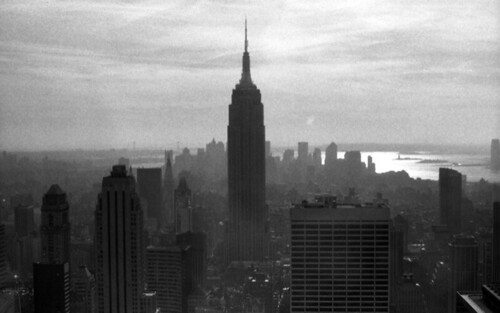
I have been following Alec Soth's very interesting blog about photography, politics, photography, ethics, photography - did I mention that his blog is interesting?
Recently he asked several questions in an area (building off an article in the New York Times on the architectural photographer, Julius Schulman, who lamented the loss of people in architectural photography) that has been in the front of my head this year - that of the role of people in documentary photos and from there, the role of photojournalism in the art world.
Here is the post, along with comments, including my own which I have inserted below. The parts of the conversation preceding my comments that interested me most were those responding to a Luc Delahaye photo of a dead Taliban soldier in a ditch which was recently priced for sale at $15,000 and the Robert Polidori photographs of the devastation wrought by Hurricane Katrina. I am not so interested in the ethics of photographing these images, but rather, I am interested in the ethics of their presentation and reception.
~~~~~>
I keep thinking of the scene in Woody Allen’s film where he walks into his kitchen and there is a wall-sized reproduction of Eddie Adams’ photo of the Vietnamese police sargeant executing a VC prisoner in the streets of Saigon. That photo had immediate, terrific impact when it appeared in the press, but Allen I think recognized that very quickly it became wall decoration and that the decoration included the emotional charge of the image as well as the charge from the lack thereof. Or as Susan Sontag said, “There is the satisfaction at being able to look at the image without flinching. There is the pleasure of flinching.”
I don’t begrudge photographers like Nachtwey, Delahaye, Haviv, Kratochvil, and others the right to make a living through their work. But I wonder if the presentation of these works in galleries and museums where only a small percentage of the public goes does not merely assuage the angst of inactivity in the face of tragedy among a group of people by offering them a view of the tragedy as a surrogate for solving or rectifying the contributing factors of that tragedy. What, for example, are people to say or do upon seeing Polidori’s photographs? Buy one? Make a donation? Vote for officials who will never allow this to happen again? Or as I overheard more than a few people say in the Met where several of his New Orleans series are/were hanging, comment upon the opulently rotten beauty of the photographs and head for the Picassos.
I think we can all understand the motivation of these photographers for selling their work - most have worked for relatively low pay in exceptionally dangerous, life threatening conditions. Haviv even had a contract on his life taken out by the infamous Arkan of the Serbian paramilitary group, Arkan’s Tigers. His photo of one of Arkan’s men kicking a dead or dying woman lying on the ground is a tremendously “impactful” image. Sontag has already commented on the graceful pose of the soldier as he delivers the blow. But this image is also for sale at the Museum of War Photography in Dubrovnik. If not to hang this over their couch, what then would be the motivation of the collector who would buy this? An investment?
I don’t know. Why would you buy Luc Delahaye’s photo for $15,000 and not send $15,000 to help build a school in Afghanistan? I can only guess that the surrogacy of these images is profound - that it represents a tremendous need to do something that grows out of the activating energy of the image itself. But even then - even if it comes from the need to do something, what is being done by buying an image such as this seems profoundly impotent. Perhaps that is our current condition - that we are condemned to an explicit awareness of tragedy around us and yet continually lack what is actually required to effect change through accurately directed action.
No answers here then. Just an open and ongoing struggle to understand…
Sunday, November 19, 2006
Milton Friedman is Dead
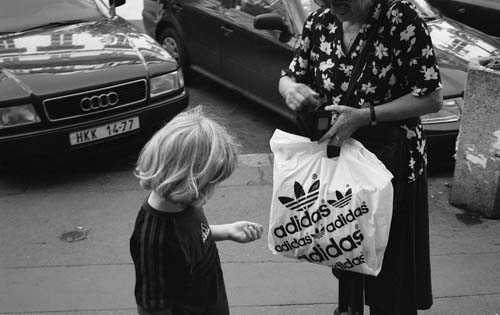
I walked past a national electronics retailer and saw this gianormous line running around and around and around the block complete with barricades and cops and sleeping bags and some pot smoking and some girls who looked like they really really loved their boyfriends at least enough to hold their place in line while the boyfriend was at work at the local CD store or bookstore or guitar store or in class studying Neetchee and all that dark philosophy stuff you know man like it’s fucked up and I thought hey! must be something really important so I asked hey! what's so important and the guy in the front of the line said for the one millionth time today man its like the new playstation you know like from sony and all like we're waiting for it you know so I said word and he said yeah it's cool though dude cause I am going to like sell it for like ten times what's worth to some dude from japan or something like on ebay or something you know and the guy behind him looked homeless which he was and so were a couple other guys and they had either been paid by someone to stand in line for someone or had seen an opportunity and had gotten up and gotten into line at some point earlier in the day and were waiting for 11:55PM 5 minutes before the doors opened and the whole deal happened like lightning hitting a speeding boat whereupon they were going to sell their place in line to the highest bidder and then go get ripped and sleep it off and then go get ripped again and then when I got home I read that today Milton Friedman died at 94 years old and I thought no he's not he's living on the streets of NYC standing in line getting ready to take advantage of someone who wants something just a little bit more than he does and will pay for it.
Monday, October 23, 2006
Daniel Ellsberg Helpfully Predicts the Past
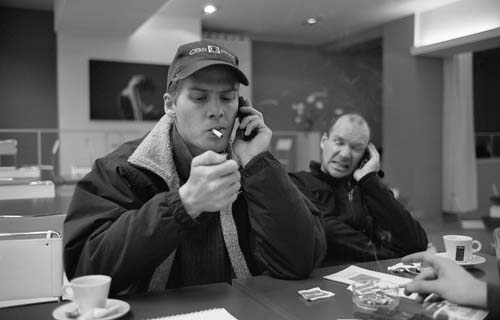
Daniel Ellsberg article from 10/22/06 in Harpers
The irritating part is that Ellsberg's article relates past events. That the build up to Iraq WAS exactly like the build up to Vietnam. He did not write this article during the build up to Iraq. If my friends and I, sitting at a table in Prague with three newspapers spread out in front of us in early 2002, could predict the outcome of the Bush Adventure in Iraq and forecast all the things that would go badly - and we did, nearly to the letter (this is not bragging - this is depression) - as well as show how weak the President's case was for going to war, how far down river Colin Powell had sold himself and the country along with it, and how little Iraq had to do with OBL & how much it had to do with oil, ANYONE could have done it. It was not hard. But America was psychotic, and the press & most of the left were either asleep or suffering from a national Stockholm syndrome, captured and mollified as they were by the threat of appearing unpatriotic (if you are fighting for what you believe to be the democratic ideal, how can you be unpatriotic in a country which holds democracy as its ideal?) at the gunpoint pointed at them from the right through the cross-hairs of the Patriot Act.
In a backa$$ward way, I think what will actually save America is its failure to win in Iraq. If, on the heels of the success of the Patriot Act I, the military, at the behest of this administration, had won a decisive victory in Iraq (though impossible for any western government to do ever) then the power that the administration would have felt its right to take and keep would have been immense. And I think our democracy would then become one where life and the pursuit of happiness would be guaranteed, but not necessarily liberty. That would become a conditional given at the pleasure of the government.
I think I like the whacko conservatives in the west more than the whacko liberals of the east. The western conservatives never forget that the greatest threat to this country will always be our own government. The liberals think that government can be made into your buddy.
Ellsberg said once that the thing in government that most truly corrupts is not money and power, it is the secret information, like the dossiers on the Johnson administration's goals for their involvement in Vietnam, that a select group of people in government get to see. Once you have read that information, he said, the arguments of people who do not have access appear stupid and irrational, not based on facts and merely jousting at windmills. And that breeds contempt among those people who have access to top secret documents for all the people who don't have access - which, as Ellsberg notes, is nearly everyone else in the country.
Which of course makes the final part of Ellsberg's essay (excerpted as it is from his book) scarier. The efforts of the Bush administration to develop plans for a war against Iran must be seen through the lens of Ellsberg's caution about the corrupting influence of top secret information. What may be farthest from the consciences of those with security clearance in Washington is that possession of top secret information merely makes them informed, but it does not - especially in a democracy - make them right. They may be arrogant enough to feel their information charges them to pursue their mission outside the will of the people, as Reagan did in Iran-Contra (note the irony of Iran's position in both operations - this is naught but a war of princes!) We hope that our system checks the arrogance of the few who might seek to work in opposition to the will of the many. Should the left win control of one or both houses in Congress, we will see whether our hope will be met satisfactorily.
Monday, May 29, 2006
First post - Tbilisi Georgia and the Caucasus
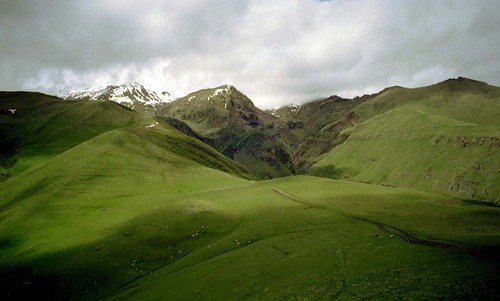
So I am in Tbilisi, Georgia right now, typing away on a wifi connection in our hotel room with a view of Tbilisi's city hall just outside my window. A few days ago, the first hundred or so of several thousand soldiers were practicing their marching skills for the celebration of Georgian Independence Day, May 26th. Like the Czechs, the Georgians have a couple days that could be considered independence days. This one represents the day in 1918 when the Georgians declared their independence from Russia who had governed them for 117 years previously, an independence that only lasted two years. The most recent moment of Georgian history that most people outside of Georgia remember is the Rose Revolution when Eduard Shevardnadze was excused from power and the democratic government of 36 year old Mikheil Saakashvili took over after storming the Parliament armed only with roses in 2003. Before that, tanks rolled down Rustaveli street, the street where my hotel sits, and fired directly into many of the buildings, lighting them on fire and either gutting or destroying quite a few. And that is only the twentieth century - the history of Georgia is immense.
Most of you know that currently Georgia is strategically important to the United States as it has allowed US warplanes to operate in Georgian airspace during the various campaigns in Iraq and Afghanistan (not too far away - Georgia is due north of eastern Turkey.) And Georgia, through Shevardnadze's wily marketing of Georgia as a thoroughfare, is the bed upon which several very important oil pipelines run, carrying energy supplies from Baku, Azerbaijan to the Black Sea directly and to the Mediterranean Sea through Turkey. This is why my wife is here. Her firm is helping Georgia settle a dispute that grew out of the building of the pipeline.
Still, even with the oil transport money coming into the country, there just is not enough money here. As a result of the devastating earthquake of 2002, which registered a 6 on the Richter scale and caused approximately $45million in damage while displacing 15,000 people, the historic old town in Tbilisi is on the verge of falling to the ground, a architectural loss akin I think to what is happening in Havana or Tirana, Albania or other places that continue to suffer after the fall of the Iron Curtain (unlike Prague, for which there seems to be no end to foreign investment.) Unemployment is high, worse in the countryside, and the optimism of the Rose Revolution is constantly bruised by the day to day realities of being torn between Georgia's love-hate relationship with Russia and a growing trade relationship with Western Europe and the United States, symbolized by the country's geographic location in neither Europe nor Asia.
The army is an achievement of sorts. Georgia must maintain an army, partly because several of the Georgian states have declared themselves independent from Georgian control and threaten retaliation if Georgia tries to reestablish sovereignty, and partly because Russia is the 3000 pound giant waiting at the door who would think nothing of (and has in the past) sending in troops as it sees fit. As it has historically for centuries, Georgia has to defend itself from the constant threat of invasion. In the end though, a fit Georgian army is simultaneously reassuring and depressing. Reassuring because small armies have frequently shown their ability to hold off even the largest and strongest countries in the world. Depressing because this effort has often resulted in the near annihilation of that country, as it has in Chechnya.
Over the weekend, we headed out into the area surrounding Tbilisi to see some of the buildings and sites associated with early Christianity in Georgia, as well as Stalin's hometown of Gori and a cave town whose habitation began in the first century B.C. Quite astounding. Georgia is just ancient. I suppose one gets the same impression from visiting Greece or Italy, but frequently here, we were the only tourists at the site. Everyone else was going to church or farming or shepherding a flock of sheep somewhere. So the impression feels much less packaged and contained. And the sites are incredible, located as they are in strategic positions to defend against a seemingly endless wave after wave of attackers who repeatedly wrecked things over the centuries. When we found ourselves among tourists, they were Georgian, mostly school children who are delightfully brave and quickly say "hello" and "isn't it beautiful" in English. If the energy of the youngsters is any indication, this country has a bright future.
We did see some Japanese tourists while visiting Stalin's birthplace, however. Gori is a very strange place. The only indication that we got of any of Stalin's faults was that perhaps collectivization of farming was not such a good idea. Obviously Gori is an important part of Georgian history, but it would be a shame if it gets tourist dollars to the exclusion of other places in Georgia, i.e. tour buses zoom past something from the 4th century to look at a statue made in the 1950's of someone who was responsible for the deaths of millions, including Georgians.
Most of the churches we saw had at one time been entirely white-washed by the Soviets - that is to say, all the frescos and decorated surfaces were coated with white paint or white plaster and either left derelict, converted to historic monuments or used as theatres or other secular functions. Renovations are recent and ongoing, but the amazing thing is that Georgia has been trashed by the Persians, Tamerlane, the Russians, earthquakes, etc. and still these older sites are standing. The masonry skill is tremendous, and the supposition is that the chemical properties of the mortar, which included eggs in the mix, made the buildings flexible but stable.
On Sunday we headed north out of Tbilisi on the Georgian Military Highway that leads to the Russian - Georgian border. The road runs along the Aragvi river until the river's valley gets too steep, whereupon the roads begins to climb to the Dzhrvi pass, elevation 7858 feet, then down the other side to Kobi, a flat spot at 6339 feet where four mountain valleys meet, and on to Kazbegi at the foot of the huge Mt. Kazbek (16,500 feet) where a small church sits perched on a cliff above the town. A little bit further down the road beyond Kazbegi is the Darial gorge, the end of the known world for the Romans and the site of the Russian - Georgian border. Just shy of a hundred kilometers north of the border (if that) is the town of Beslan, unfortunately famous for the school massacre that took place a while ago. The whole area is contentious, with the Russian at the border, the Chechens to the northwest, and the South Ossetians, one of the rebel regions in Georgia that claims autonomy, just over the mountains on the east bank of the Aragvi river. The Russians accuse the Georgians of aiding the Chechens, and the Georgians accuse the Russians of arbitrarily shutting off the natural gas pipeline that keeps everyone warm in the winter & of meddling in South Ossetia and Abkhazia.
The scenery is primeval. Most of the rock formations are the result of volcano, earthquake or both. Huge uplifts of rock jut out with angular striations, striated volcanic plugs flake into geometric tailings, and large expanses show evidence of lava flow from the once active volcanoes in the region. Much of the rock color is gray, but there are also areas that are colored an intense red, or in the case of sulfurous outflow, bright yellow, white and green. The mountains are sharp edged and pointed. Rocks are everywhere. Landslides seem to happen frequently, and at several locations, we could see buildings up to their second floors in scree, though it was difficult to tell whether the slide had occurred yesterday or several years ago.
People live throughout the area and have for centuries. The mountains, if you are tough enough to withstand the horrendous winters (6 meter snowfall at times) and the vertical territory, allow you to stay one step ahead of your enemies who may not be so hardy or prepared. Towers are sprinkled liberally throughout the valley and functioned as an early warning system when invaders approached. If you have seen the movie, The Lord of the Rings and watched the scene when the towers are lit to signal far off kingdoms of the coming invasion, you will have a sense of how some of the Georgian towers functioned and what it felt like standing beneath them.
Shepherding is a common vocation, and the shepherds spend their springs driving the herds up out of their pens in the valleys towards the alpine meadows in the heights. When you see a flock of sheep up on a highland meadow, the first question is how did they get up there? Then the second question is how will they get back down. The routes are often not easily seen from a distance, and I am sure that too is purposeful. A sheep meadow with only a few ways to enter or exit makes the work of the shepherds and their sheep dogs (large white dogs with brown and black splotches and bobbed tails) easier when it comes to watching for wolves.
Pretty spectacular but hard life. If you want a really good read for some Georgian history & culture, as well as a ripping yarn, try to find Tony Anderson's excellent book, Bread & Ashes. I don't think it is distributed in the U.S., but you can follow the link and get it through Amazon in the U.K. Highly recommended.
You can see my photos from the trip at the links below or by just going to my site on Flickr. Before you start wondering, I have gotten a small Canon Digital Elph camera to carry along and shoot snaps so I can post on the road, so to speak. This is an experiment. So far the quality seems pretty good, but I haven't given up on film by any stretch, as evidenced by the last link below. Rather I have been shooting film and digital both, which makes for a heavier bag but not by too much.
Day 1
Day 2
Day 3
Day 4
Day 5
Film Shots
Thanks for looking. Hope everyone is well.
Subscribe to:
Comments (Atom)